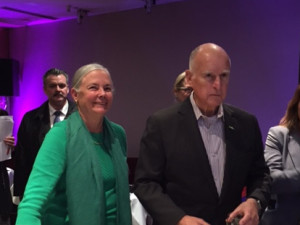COP21 Diary – Reaching a Global Agreement at COP21
By Laurie Wayburn, President of Pacific Forest Trust
 The goal of the Paris Climate Talks is to reach a global agreement on climate and that is an enormous undertaking! Global attention to this Conference of Parties (COP) is unprecedented, as is media coverage in the U.S. There is more hope and hype than I’ve ever seen in past annual meetings.
The goal of the Paris Climate Talks is to reach a global agreement on climate and that is an enormous undertaking! Global attention to this Conference of Parties (COP) is unprecedented, as is media coverage in the U.S. There is more hope and hype than I’ve ever seen in past annual meetings.
The crux of the problem is that despite our best rhetoric, the greenhouse gas emission (GHG) growth trajectory has blown past every “safe limit” set by the Intergovernmental Panel on Climate Change. We are currently on track to go well past the 2 degree Celsius limit (we are on a path to over 8 degrees) if we don’t take strong and immediate measures to curb GHG emissions. It is now broadly acknowledged that there is simply no way to tackle this challenge without significant changes in conserving and managing our forests.
Sadly, some of the global efforts focused on forests, such as using them to meet renewable energy targets as a source of biomass energy, have been based on wishful thinking. Europe provided major subsidies for adding woody biomass to its energy mix, under the simple premise that forests were a renewable resource. The logic was that, if you cut 20-30-year-old trees, use them for energy, and then regrow them for at least that time period they will re-absorb the CO2 that was released when they were burned.
That sounds like a closed loop, right? And forest energy could be renewable if there were binding agreements to regrow similarly aged forests and retain overall forest extent. But, there have been no such agreements. And we’ve seen the impact in southern forests of the U.S.
Woody biomass is being made largely from slow-growing hardwood trees—many 80-100 years old, and we have a net increase in emissions overall. It’s a lesson to be learned—binding commitments are needed for good intentions to be realized. We can’t let the appealing politics of renewable energy overwhelm the science of forest carbon accounting.
Conversations at the Paris Climate Talks, like the Global Landscapes Forum on December 5-6, are largely focused on seeing how richer, northern countries can partner with forested, tropical countries to provide an alternate forest economy based on paying to keep more forests standing and promoting restoration.
However, the U.S. needs the same changes to its forest economy. Markets for saving forests—be it public or private financing—fall woefully short of the need. That is why we continue to lose over 1.25 million acres of forest every year. And, it’s not just the individual acres—it’s the overall forest function that is lost as we convert acre after acre to other uses.

Fran Paveley, author of AB 32 (left), with California Governor, Jerry Brown (right), at COP21 in Paris, France.
California has made more binding commitments to lowering its CO2 emissions than any other country—and is on track to meet each target has set. Meanwhile, California’s economy is thriving. Pacific Forest Trust’s work led to the inclusion of forests and other lands in California’s landmark climate law AB 32—the Global Warming Solutions Act. The Air Resources Board studies show that forests will contribute more than any other sector to meet our 2030 goals for emissions reductions. The parameters of how that will happen are currently under development and the draft Implementation Plan for the next portion of AB 32 lays out some great pathways forward. State representatives are presenting the emerging foundation of its approach to these issues during the Global Landscapes Forum. As with other pledges with the COP, the proof will be in the implementation.
View Other COP21 Posts:
- Climate Progress: A better problem to have – December 8, 2015
- Sky High Ambitions for Climate Solutions – December 4, 2015
Photo Credits:
- Eiffel Tower – La tour Eiffel aux couleurs de la COP21 by bobostudio, CC by 2.0
- Fran Paveley and Jerry Brown at COP21 by Laurie Wayburn.
